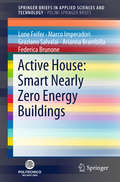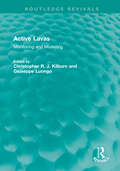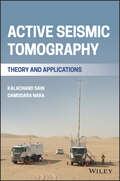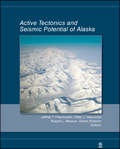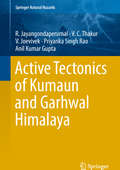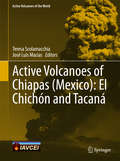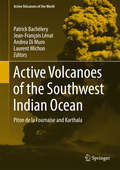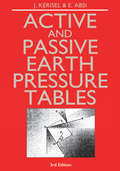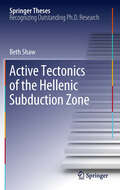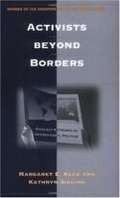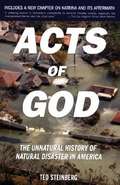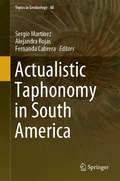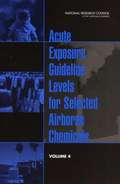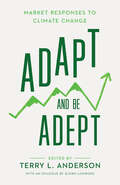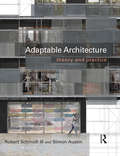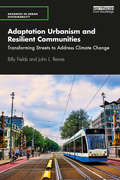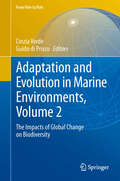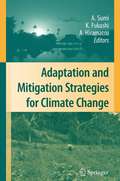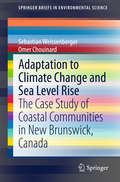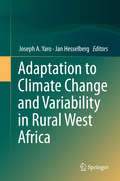- Table View
- List View
Active House: Smart Nearly Zero Energy Buildings (SpringerBriefs in Applied Sciences and Technology)
by Marco Imperadori Lone Feifer Graziano Salvalai Arianna Brambilla Federica BrunoneThe book provides an overview of the Active House (AH) vision, intended as a building design method “beyond” the passive approach for buildings of the future that will be more and more connected, smart and innovative. It offers a novel philosophical design approach in which buildings, new or renovated, are in balance with natural, renewable energies and become “concentrators-distributors” of energies instead of being consumers of resources. The book is composed of five chapters, providing information on fundamental aspects of innovations toward resource-efficient buildings, as well as case studies presenting the concept in practice. It demonstrates that a completely new design approach is possible, and that a turning point has been reached. Lastly, it shows how the AH Alliance, along with designers, institutions, industries and academies, is bringing a breath of fresh air to the world of construction.
Active Lavas: Monitoring and Modelling (Routledge Revivals)
by Christopher R.J. Kilburn Giuseppe LuongoOriginally published in 1993, Active Lavas looks at the practical aspects of monitoring uncontrolled streams of molten rock and how field data can be applied for theoretical modelling and forecasting the growth of lava flows. It describes the basic features of common subaerial lava flows and domes – both on Earth and on other bodies in the Solar System – before discussing the logistics of measuring lava properties during eruption and how these measurements are used to develop simple theoretical models for forecasting flow behaviour.
Active Particles, Volume 2: Advances in Theory, Models, and Applications (Modeling and Simulation in Science, Engineering and Technology)
by Nicola Bellomo Pierre Degond Eitan TadmorThis volume compiles eight recent surveys that present state-of-the-art results in the field of active matter at different scales, modeled by agent-based, kinetic, and hydrodynamic descriptions. Following the previously published volume, these chapters were written by leading experts in the field and accurately reflect the diversity of subject matter in theory and applications. Several mathematical tools are employed throughout the volume, including analysis of nonlinear PDEs, network theory, mean field approximations, control theory, and flocking analysis. The book also covers a wide range of applications, including:Biological network formationSocial systemsControl theory of sparse systemsDynamics of swarming and flocking systemsStochastic particles and mean field approximationsMathematicians and other members of the scientific community interested in active matter and its many applications will find this volume to be a timely, authoritative, and valuable resource.
Active Particles, Volume 3: Advances in Theory, Models, and Applications (Modeling and Simulation in Science, Engineering and Technology)
by Nicola Bellomo Eitan Tadmor José Antonio CarrilloThis edited volume collects six surveys that present state-of-the-art results on modeling, qualitative analysis, and simulation of active matter, focusing on specific applications in the natural sciences. Following the previously published Active Particles volumes, these chapters are written by leading experts in the field and reflect the diversity of subject matter in theory and applications within an interdisciplinary framework. Topics covered include:Variability and heterogeneity in natural swarmsMultiscale aspects of the dynamics of human crowdsMathematical modeling of cell collective motion triggered by self-generated gradientsClustering dynamics on graphsRandom Batch Methods for classical and quantum interacting particle systemsThe consensus-based global optimization algorithm and its recent variantsMathematicians and other members of the scientific community interested in active matter and its many applications will find this volume to be a timely, authoritative, and valuable resource.
Active Particles, Volume 4: Theory, Models, Applications (Modeling and Simulation in Science, Engineering and Technology)
by Eitan Tadmor José Antonio CarrilloThis edited volume collects nine surveys that present the state-of-the-art in modeling, qualitative analysis, and simulation of active particles, focusing on specific applications in the natural sciences. As in the preceding Active Particles volumes, it blends diverse applications that demonstrate the interdisciplinary nature of the subject and the various mathematical tools available. Contributions were selected with the aim of covering a variety of viewpoints, from modeling the interactions in collective dynamics of animals and in population dynamics; through neural-networks, semi-supervised learning, and Monte Carlo methods in optimization; to kinetic and continuum theories with applications to aggregations and birth-and-death processes. Mathematicians and other members of the scientific community interested in active matter and its many applications will find this volume to be a timely, authoritative, and valuable resource.
Active Seismic Tomography: Theory and Applications
by Kalachand Sain Damodara NaraImaging complex regions or difficult terrains like the sub-volcanic sediments or thrust fold belt areas is crucial to understanding the earth's subsurface. Active Seismic Tomography: Theory and Applications describes current technologies for the study of seismic velocities and the elucidation of fine details of the subsurface. Key use cases include hydrocarbon reservoir characterization, identification of faults and channels, and stratigraphic and structural traps.Volume highlights include: Theory and development of seismic tomographyNumerous examples of the interpretation and analysis of active source seismic data Relevance of tomography data for computational geophysicists This volume is a valuable resource for academics and professionals interested in using or developing integrated imaging approaches of the Earth's subsurface.
Active Tectonics and Seismic Potential of Alaska
by Jeffrey T. Freymueller Peter J. Haeussler Robert L. Wesson Göran EkströmPublished by the American Geophysical Union as part of the Geophysical Monograph Series, Volume 179. This multidisciplinary monograph provides the first modern integrative summary focused on the most spectacular active tectonic systems in North America. Encompassing seismology, tectonics, geology, and geodesy, it includes papers that summarize the state of knowledge, including background material for those unfamiliar with the region; address global hypotheses using data from Alaska; and test important global hypotheses using data from this region. It is organized around four major themes: subduction and great earthquakes at the Aleutian Arc, the transition from strike slip to accretion and subduction of the Yakutat microplate, the Denali fault and related structures and their role in accommodating permanent deformation of the overriding plate, and regional integration and large-scale models and the use of data from Alaska to address important global questions and hypotheses. The book's publication near the beginning of the National Science Foundation's EarthScope project makes it especially timely because Alaska is perhaps the least understood area within the EarthScope footprint, and interest in the region can be expected to rise with time as more EarthScope data become available.
Active Tectonics of Kumaun and Garhwal Himalaya (Springer Natural Hazards Ser.)
by Anil Kumar Gupta R. Jayangondaperumal V. C. Thakur V. Joevivek Priyanka Singh Rao<P>The book contributes to understanding the pattern of strain release and the level of seismic hazard imposed by large-great earthquakes in the frontal fold-thrust belts of Kumaun and Garhwal regions of Uttarakhand. <P>The motivation for active fault studies and their characterization have been emphasized. The book presents the compilation of knowledge garnered in multidisciplinary or proxy studies involved in the understanding of seismic hazard in general and Kumaun–Garhwal Himalaya regions in particular with lucid new maps draped on modern Cartosat or SRTM DEM data. <P>It also discusses satellite image calibration, active faults identifications, and map productions with flowchart. The book discusses window-wise active fault elements with attributes together with the tectonic geomorphic map. It also includes active fault scarp with topographic profile along with field photographs. Finally, it reviews all existing seismotectonic models of the Himalaya, its earthquake hazard, and its vulnerability, specifically for Kumaun and Garhwal regions.
Active Volcanoes of Chiapas: El Chichón And Tacaná (Active Volcanoes of the World)
by Teresa Scolamacchia José Luis MacíasThis publication summarizes the studies carried out at two of the most active volcanoes of Chiapas (Mexico): El Chichón and Tacaná. El Chichón erupted explosively in 1982 killing more than 2000 people being the worst volcanic disaster in Mexico, and Tacaná produced two mild phreatic explosions in 1950 and 1986. Only after these explosions a surge of new studies began to unreveal their volcanic history and impact. This book presents the state of the art advances in topics related to the geologic setting of the two volcanoes, their eruptive history and composition of erupted products, the hydrothermal systems and their manifestations. Volcanic hazards and risks and possible mitigation plans are discussed based on the experience of the catastrophic eruption of El Chichón that occurred in 1982. The book will also include previously unpublished material on the flora and the fauna of the region and archaeological and social aspects of the area that is inhabited by indigenous people.
Active Volcanoes of the Southwest Indian Ocean: Piton de la Fournaise and Karthala (Active Volcanoes of the World)
by Patrick Bachelery Jean-François Lenat Andrea Di Muro Laurent MichonPiton de la Fournaise and Karthala are both shield volcanoes in the southwest Indian Ocean. This publication summarizes the work done on these very active basaltic volcanoes. Piton de la Fournaise has a long history of scientific research and monitoring, with many data collected during recent eruptions. It is certainly one of the most studied volcanoes in the world. The work presented in this monograph includes geological, geophysical, geochemical and petrological aspects, but also studies on physical geography, natural hazards and the sociological and behavioural approaches. ' The Karthala volcano may be less well known, but it serves as an interesting comparison to Piton de la Fournaise. Although situated close to the volcanoes of Hawaii, it differs from them by its more alkaline magmas and less frequent activity. It was also monitored for more than 25 years, producing extraordinary eruptions in recent years.
Active and Passive Earth Pressure Tables
by E. AbsiThe problem of earth pressure on retaining structures is one of the oldest in soil mechanics. This volume comprises tables which facilitate calculations in problems of limit equilibrium. These tables provide coefficients which are extreme values in which the soil still is in equilibrium. They are or
Active tectonics of the Hellenic subduction zone (Springer Theses)
by Beth ShawThis thesis is remarkable for the wide range of the techniques and observations used and for its insights, which cross several disciplines. It begins by solving a famous puzzle of the ancient world, which is what was responsible for the tsunami that destroyed settlements in the eastern Mediterranean in 365 AD. By radiocarbon dating of preserved marine organisms, Shaw demonstrates that the whole of western Crete was lifted out of the sea by up to 10 meters in a massive earthquake at that time, which occured on a previously unknown fault. The author shows that the resulting tsunami would have the characteristics described by ancient writers, and uses modern GPS measurements and coastline geomorphology to show that the strain build-up near Crete requires such a tsunami-earthquake about every 6.000 years - a major insight into Mediterranean tsunami hazard. A detailed seismological study of earthquakes in the Cretan arc over the last 50 years reveals other important features of its behaviour that were previously unknown. Finally, she provides fundamental insights into the limitations of radiocarbon dating marine organisms, relating to how they secrete carbon into their skeletons. The thesis resulted in three major papers in top journals.
Activists Beyond Borders: Advocacy Networks in International Politics
by Margaret E. Keck Kathryn SikkinkSurvey of non-governmental organizations' role in pressing for improvements in areas such as human rights, environmental stewardship and more.
Activists beyond Borders
by Margaret E. Keck Kathryn SikkinkA masterful combination of emerging theory and empirical comparison of one of the most intriguing areas of transnational politics. Keck and Sikkink access a broad range of theory from social movements, international relations, and comparative politics research to glean from a wealth of their own research findings solid and thought-provoking conclusions about the most interesting and least well-understood area of contentious politics in the world today. -Sidney Tarrow, Cornell University (Government) "Activists beyond Borders is a searching exploration of advocacy networks, providing compelling accounts in areas such as human rights and environmental protection and an intriguing glimpse into the transnational politics of the twenty-first century. "-Robert O. Keohane, Duke University Margaret E. Keck and Kathryn Sikkink examine a type of pressure group that has been largely ignored by political analysts: networks of activists that coalesce and operate across national frontiers. Their targets may be international organizations or the policies of particular states. Historical examples of such transborder alliances include anti-slavery and woman suffrage campaigns. In the past two decades, transnational activism has had a significant impact in human rights, especially in Latin America, and advocacy networks have strongly influenced environmental politics as well. The authors also examine the emergence of an international campaign around violence against women.
Acts of God: The Unnatural History of Natural Disaster in America (Second Edition)
by Ted SteinbergAs the waters of the Mississippi River and Lake Pontchartrain began to pour into New Orleans, people began asking the big question - could any of this have been avoided? How much of the damage from Hurricane Katrina was bad luck, and how much was poor city planning? Steinberg's Acts of God is a provocative history of natural disasters in the United States. This revised edition features a new chapter analyzing the failed response to Hurricane Katrina, a disaster Steinberg warnedcould happen when the book first was published. Focusing on America's worst natural disasters, Steinberg argues that it is wrong to see these tragedies as random outbursts of nature's violence or expressions of divine judgment. He reveals how the decisions of business leaders and government officials have paved the way for the greater losses of life and property, especially among those least able to withstand such blows - America's poor, elderly, and minorities. Seeing nature or God as the primary culprit, Steinberg explains, has helped to hide the fact that some Americans are simply better able to protect themselves from the violence of nature than others. In the face of revelations about how the federal government mishandled the Katrina calamity, this book is a must-read before further wind and water sweep away more lives. Acts of God is a call to action that needs desperately to be heard.
Actualistic Taphonomy in South America (Topics in Geobiology #48)
by Sergio Martínez Alejandra Rojas Fernanda CabreraHighlighting the latest research on Actualistic Taphonomy (AT), this book presents the outcomes of a meeting that took place in Montevideo, Uruguay, in October 2017. Its respective chapters offer valuable insights into South American archaeology, invertebrate and vertebrate fauna, and flora. In recent years, there has been a surge of new research on AT, as evidenced by numerous papers, talks, theses, etc. However, there are still very few AT books or even dedicated journal articles. Reflecting the discipline’s newfound maturity, this book, written by South American authors, offers a unique resource for academics and students of Paleontology, Geology, and Biology around the world.
Acute Exposure Guideline Levels for Selected Airborne Chemicals: VOLUME 4
by Subcommittee on Acute Exposure Guideline LevelsInformation on Acute Exposure Guideline Levels for Selected Airborne Chemicals.
Ada's Amazing Ideas
by Liz HuyckAda wants to win a prize one day for her inventions. She has many ideas. When it’s time to clean up her blocks, Ada has a great idea to make clean-up time easier. Ada thinks to use her father’s old socks to invent a way to stay on her two feet on an icy day! Ada’s ideas to recycle old things makes her a great inventor!
Adapt and Be Adept: Market Responses to Climate Change
by Terry L. AndersonHow can markets help us adapt to the challenges of climate change? Editor Terry L. Anderson brings together this collection of essays featuring the work of nine leading policy analysts, who argue that market forces are just as important as government regulation in shaping climate policy—and should be at the heart of our response to helping societies adapt to climate change.Anderson notes in his introduction that most current climate policies such as the Paris Agreement require hard-to-enforce collective action and focus on reducing or mitigating greenhouse gases rather than adapting to their negative effects. Adaptive actions can typically deliver much more, faster and more cheaply than any realistic climate policy. The authors tackle a range of issues: the hidden costs of renewable energy sources, the political obstacles surrounding climate change policy, insurance and financial instruments for pricing risk of exposure to the effects of climate change, and more.Reliance on emerging renewable energies and a carbon tax are not enough to prevent the effects of global warming, they argue. We must encourage more private action and market incentives to adapt to a rapidly changing climate.
Adaptable Architecture: Theory and practice
by Robert Schmidt III Simon AustinAdaptable Architecture provides thought-provoking and inquisitive insights into how we can prolong the useful life of buildings by designing them to be more adaptable, and hence create a more sustainable built environment. The book provides a theoretical foundation counterpointed by the experiences and ideas of those involved in the design and use of buildings. It explains many approaches to designing for change, with lessons from history, and case studies including The Cedar Rapids Public Library, Kentish Town Health Centre and Folkestone Performing Arts Centre, which stretch our thinking beyond the conventional notions of adaptability. The authors reveal the many conditions that make it a complex design phenomenon, by considering the purpose, design and business case of buildings as well as the physical product. Full of summaries, diagrams, reference charts, tables, and photos of exemplar solutions for use as conversational tools or working aids, this book is for any professional or student who wants to research, question, imagine, illustrate - and ultimately design for - adaptation. In addition, further information and resources are available through the Adaptable Futures website www.adaptablefutures.com which includes additional case studies, videos, information about industry events and up-to-the-minute developments.
Adaptation Urbanism and Resilient Communities: Transforming Streets to Address Climate Change (Advances in Urban Sustainability)
by John L. Renne Billy FieldsAdaptation Urbanism and Resilient Communities outlines and explains adaptation urbanism as a theoretical framework for understanding and evaluating resilience projects in cities and relates it to pressing contemporary policy issues related to urban climate change mitigation and adaptation. Through a series of detailed case studies, this book uncovers the promise and tensions of a new wave of resilient communities in Europe (Copenhagen, Rotterdam, and London), and the United States (New Orleans and South Florida). In addition, best practice projects in Amsterdam, Barcelona, Delft, Utrecht, and Vancouver are examined. The authors highlight how these communities are reinventing the role of streets and connecting public spaces in adapting to and mitigating climate change through green/blue infrastructure planning, maintaining and enhancing sustainable transportation options, and struggling to ensure equitable development for all residents. The case studies demonstrate that while there are some more universal aspects to encouraging adaptation urbanism, there are also important local characteristics that need to be both acknowledged and celebrated to help local communities thrive in the era of climate change. The book also provides key policy lessons and a roadmap for future research in adaptation urbanism. Advancing resilience policy discourse through multidisciplinary framework this work will be of great interest to students of urban planning, geography, transportation, landscape architecture, and environmental studies, as well as resilience practitioners around the world.
Adaptation and Evolution in Marine Environments, Volume 1: The Impacts of Global Change on Biodiversity (From Pole to Pole)
by Guido Di Prisco Cinzia VerdeThe poles undergo climate changes exceeding those in the rest of the world in terms of their speed and extent, and have a key role in modulating the climate of the Earth. Ecosystems adapted to polar environments are likely to become vulnerable to climate changes. Their responses allow us to analyse and foresee the impact of changes at lower latitudes. We need to increase our knowledge of the polar marine fauna of continental shelves, slopes and deep sea, as identifying the responses of species and communities is crucial to establishing efficient strategies against threats to biodiversity, using international and cross-disciplinary approaches. The IPY 2007-2009 was a scientific milestone. The outstanding contribution of Marine Biology is reflected in this volume and the next one on "Adaptation and Evolution in Marine Environments - The Impacts of Global Change on Biodiversity" from the series "From Pole to Pole", making these volumes a unique and invaluable component of the scientific outcome of the IPY.
Adaptation and Mitigation Strategies for Climate Change
by Ai Hiramatsu Kensuke Fukushi Akimasa SumiIn recent decades there has been a growing awareness of how intricate the interactions are between human beings and the environment. Fortunately, progress has been made in understanding this relationship, and new technologies have been effective in addressing environmental problems. However belatedly, there has been an acknowledgment of the incompatibility of the world's finite resources with humankind's increasingly greater needs for them, and of how such a challenge demands broadened collaboration among engineers, social scientists, politicians and financial powers. Global agreement that the essential issues of the twenty-first century cannot be solved by any one discipline has led to the concept of sustainability. The transdisciplinary contributions selected for inclusion in this book address these concerns with an overview of the diverse fields of study related to sustainability. This collection of work is intended to pave the way for further collaboration among scientists and nations as well.
Adaptation to Climate Change and Sea Level Rise: The Case Study of Coastal Communities in New Brunswick, Canada (SpringerBriefs in Environmental Science)
by Sebastian Weissenberger Omer ChouinardThe book provides a concise and interdisciplinary outlook on the impacts of climate change on coastal areas and how coastal communities adapt to them. The first chapter analyses how sea level rise, changing ocean conditions, or increased climate variability and the socio-environmental context of the coastal zone leads to vulnerable communities. The second chapter addresses adaptation strategies and tools, and gives some examples of their application around the world. The third chapter describes participative action research projects undertaken in New Brunswick and how this community based approach has enabled communities to increase their climate resilience.
Adaptation to Climate Change and Variability in Rural West Africa
by Joseph A. Yaro Jan HesselbergThis book presents conceptual and empirical discussions of adaptation to climate change/variability in West Africa. Highlighting different countries' experiences in adaptation by different socio-economic groups and efforts at building their adaptive capacity, it offers readers a holistic understanding of adaptation on the basis of contextual and generic sources of adaptive capacity. Focusing on adaptation to climate change/variability is critical because the developmental challenges West Africa faces are increasingly intertwined with its climate history. Today, climate change is a major developmental issue for agrarian rural communities with high percentages of the population earning a living directly or indirectly from the natural environment. This makes them highly vulnerable to climate-driven ecological change, in addition to threats in the broader political economic context. It is imperative that rural people adapt to climate change, but their ability to successfully do so may be limited by competing risks and vulnerabilities. As such, elucidating those vulnerabilities and sources of strength with regard to the adaptive capacities needed to support successful adaptation and avoid maladaptation is critical for future policy formulation. Though the empirical discussion is geographically based on West Africa, its applicability in terms of the processes, structures, needs, strategies, and recommendations for policy transcends the region and provides useful lessons for understanding adaptation broadly in the developing world.
